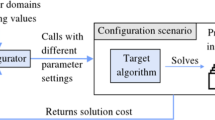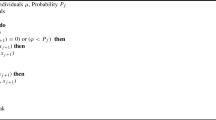Abstract
This paper introduces a new variant of a metaheuristic algorithm based on the whale optimization algorithm (WOA), the Q-learning algorithm and the Exponential Monte Carlo Acceptance Probability called (QWOA-EMC). Unlike WOA, QWOA-EMC permits just-in-time adaptive selection of its operators (i.e., between shrinking mechanism, spiral shape mechanism, and random generation) based on their historical performances as well as exploits the Monte Carlo Acceptance probability to further strengthen its exploration capabilities by allowing a poor performing operator to be reselected with probability in the early part of the iteration. Experimental results for constraints combinatorial test generation demonstrate that the proposed QWOA-EMC outperforms WOA and performs competitively against other metaheuristic algorithms.











Similar content being viewed by others
Availability of data and materials
The authors confirm that the data supporting the findings of this study come from different sources. The sources are as follows:
The data used in Sect. 5.2 are available within the article [9] and its supplementary materials.
The data used in Sect. 5.3 are available within the article [4] and its supplementary materials.
References
Hassan AA, Abdullah S, Zamli KZ, Razali R (2020) Combinatorial test suites generation strategy utilizing the whale optimization algorithm. IEEE Access 8:192288–192303
Abdullah S, Sabar NR, Nazri MZA, Ayob M (2014) An exponential Monte-Carlo algorithm for feature selection problems. Comput Ind Eng 67:160–167
Sabar, N. R., Ayob, M., & Kendall, G. (2009). Tabu exponential monte-carlo with counter heuristic for examination timetabling. In 2009 IEEE Symposium on Computational Intelligence in Scheduling (pp. 90-94). IEEE.
Hassan AA, Abdullah S, Zamli KZ, Razali R (2022) Whale optimization algorithm strategies for higher interaction strength t-way testing. Comput Mater Cont 73(1):2057–2077. https://doi.org/10.32604/cmc.2022.026310
Colbourn CJ (2004) Combinatorial aspects of covering arrays. Le Matematiche 59(1,2):125–172
Behmanesh R, Rahimi I, Gandomi AH (2021) Evolutionary many-objective algorithms for combinatorial optimization problems: a comparative study. Arch Comput Meth Eng 28(2):673–688
Kassaymeh S, Abdullah S, Al-Laham M, Alweshah M, Al-Betar MA, Othman Z (2021) Salp swarm optimizer for modeling software reliability prediction problems. Neural Process Lett 53(6):4451–4487
Muazu AA, Hashim AS, Sarlan A (2022) Review of nature inspired metaheuristic algorithm selection for combinatorial t-way testing. IEEE Access 10:27404–27431
Esfandyari S, Rafe V (2018) A tuned version of genetic algorithm for efficient test suite generation in interactive t-way testing strategy. Inf Softw Technol 94:165–185
Sabharwal S, Bansal P, Mittal N, Malik S (2016) Construction of mixed covering arrays for pair-wise testing using probabilistic approach in genetic algorithm. Arab J Sci Eng 41(8):2821–2835
Bansal P, Sabharwal S, Mittal N, Arora S (2015) Construction of variable strength covering array for combinatorial testing using a greedy approach to genetic algorithm, e-Inf Softw Eng J 9(1)
Wu H, Nie C, Kuo F-C, Leung H, Colbourn CJ (2014) A discrete particle swarm optimization for covering array generation. IEEE Trans Evolut Comput 19(4):575–591
Ahmed BS, Abdulsamad TS, Potrus MY (2015) Achievement of minimized combinatorial test suite for configuration-aware software functional testing using the cuckoo search algorithm. Inf Softw Technol 66:13–29
Alsewari ARA, Zamli KZ (2012) Design and implementation of a harmony-search-based variable-strength t-way testing strategy with constraints support. Inf Softw Technol 54(6):553–568
Zamli KZ, Din F, Ahmed BS, Bures M (2018) A hybrid q-learning sine-cosine-based strategy for addressing the combinatorial test suite minimization problem. PloS One 13(5):e0195675
Mahmoud T, Ahmed BS (2015) An efficient strategy for covering array construction with fuzzy logic-based adaptive swarm optimization for software testing use. Exp Syst Appl 42(22):8753–8765
Zamli KZ, Ahmed BS, Mahmoud T, Afzal W (2018) Fuzzy adaptive tuning of a particle swarm optimization algorithm for variable-strength combinatorial test suite generation, arXiv preprint arXiv:1810.05824
Zamli KZ, Din F, Baharom S, Ahmed BS (2017) Fuzzy adaptive teaching learning-based optimization strategy for the problem of generating mixed strength t-way test suites. Eng Appl Artif Intell 59:35–50
Nasser AB, Zamli KZ, Ahmed BS (2019) Dynamic solution probability acceptance within the flower pollination algorithm for t-way test suite generation, arXiv preprint arXiv:1902.11160
Htay KM, Othman RR, Amir A, Alkanaani JMH (2021) Gravitational search algorithm based strategy for combinatorial t-way test suite generation. J King Saud Univ Comput Inf Sci 34(8):4860–4873
Wolpert DH, Macready WG (1997) No free lunch theorems for optimization. IEEE Trans Evolut Comput 1(1):67–82
Mirjalili S, Lewis A (2016) The whale optimization algorithm. Adv Eng Softw 95:51–67
Watkins CJ, Dayan P (1992) Q-learning. Mach Learn 8(3–4):279–292
Samma H, Lim CP, Saleh JM (2016) A new reinforcement learning-based memetic particle swarm optimizer. Appl Soft Comput 43:276–297
Alazzawi AK, Rais HM, Basri S (2019) Abcvs: an artificial bee colony for generating variable t-way test sets. Int J Adv Comput Sci Appl
Jenkins B (2016) Jenny test tool. http://www.burtleburtle.net./bob/math/jenny.html
Williams AW (2000) Determination of test configurations for pair-wise interaction coverage. In: Testing of communicating systems, Springer, pp 59–74
Czerwonka J, Butt D, Gens C (2006) Pairwise testing in real word: practical extensions to test case generators. In: Proceedings of the 24th pacific northwest software quality conf, Vol. 2006
Lei Y, Kacker R, Kuhn DR, Okun V, Lawrence J (2008) Ipog/ipog-d: efficient test generation for multi-way combinatorial testing. Softw Test Verif Reliab 18(3):125–148
Lei Y, Kacker R, Kuhn DR, Okun V, Lawrence J (2007) Ipog: a general strategy for t-way software testing. In: 14th Annual IEEE international conference and workshops on the engineering of computer-based systems (ECBS’07), IEEE, pp 549–556
Torres-Jimenez J, Perez-Torres JC (2019) A greedy algorithm to construct covering arrays using a graph representation. Inf Sci 477:234–245
Alsewari A, Zamli KZ, Al-Kazemi B (2015) Generating t-way test suite in the presence of constraints. J Eng Technol (JET) 6(2):52–66
Cohen MB, Dwyer MB, Shi J (2007) Interaction testing of highly-configurable systems in the presence of constraints. In: Proceedings of the 2007 international symposium on Software testing and analysis, pp 129–139
Alsariera YA, Ahmed HAS, Alamri HS, Majid MA, Zamli KZ (2018) A bat-inspired testing strategy for generating constraints pairwise test suite. Adv Sci Lett 24(10):7245–7250
Alazzawi AK, Rais HM, Basri S, Alsariera YA (2019) Phabc: a hybrid artificial bee colony strategy for pairwise test suite generation with constraints support. In: 2019 IEEE student conference on research and development (SCOReD), IEEE, pp 106–111
Zamli KZ, Klaib MF, Younis MI, Isa NAM, Abdullah R (2011) Design and implementation of a t-way test data generation strategy with automated execution tool support. Inf Sci 181(9):1741–1758
Vlad-Roubtsov, Emma: a free java code coverage tool (2006). http://emma.sourceforge.net
Altawallbeh Z, Al-Smadi M, Komashynska I, Ateiwi A (2018) Numerical solutions of fractional systems of two-point bvps by using the iterative reproducing kernel algorithm. Ukrain Math J 70(5):687–701
Acknowledgements
This work was supported by the Ministry of Education, Malaysia (FRGS /1/2019/ICT02/UKM/01/1), and the Universiti Kebangsaan Malaysia (DIP-2016-024). Ali Abdullah Hassan would like to express his gratitude to Hadhramout Foundation in Yemen for their tuition fee support.
Author information
Authors and Affiliations
Corresponding author
Ethics declarations
Conflict of interest
The authors declare that they have no known competing financial interest or personal relationship that could have appeared to influence the work reported in this paper.
Additional information
Publisher's Note
Springer Nature remains neutral with regard to jurisdictional claims in published maps and institutional affiliations.
Rights and permissions
Springer Nature or its licensor (e.g. a society or other partner) holds exclusive rights to this article under a publishing agreement with the author(s) or other rightsholder(s); author self-archiving of the accepted manuscript version of this article is solely governed by the terms of such publishing agreement and applicable law.
About this article
Cite this article
Hassan, A.A., Abdullah, S., Zamli, K.Z. et al. Q-learning whale optimization algorithm for test suite generation with constraints support. Neural Comput & Applic 35, 24069–24090 (2023). https://doi.org/10.1007/s00521-023-09000-2
Received:
Accepted:
Published:
Issue Date:
DOI: https://doi.org/10.1007/s00521-023-09000-2




